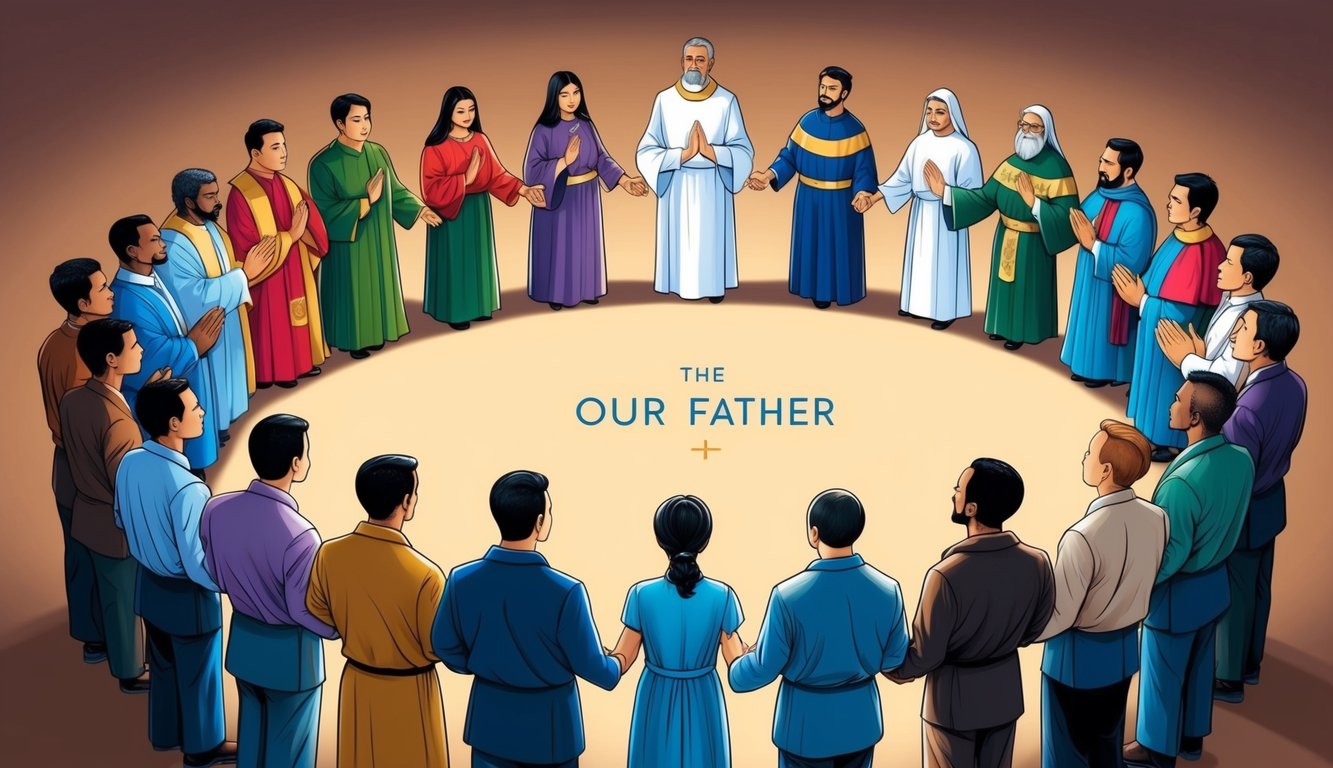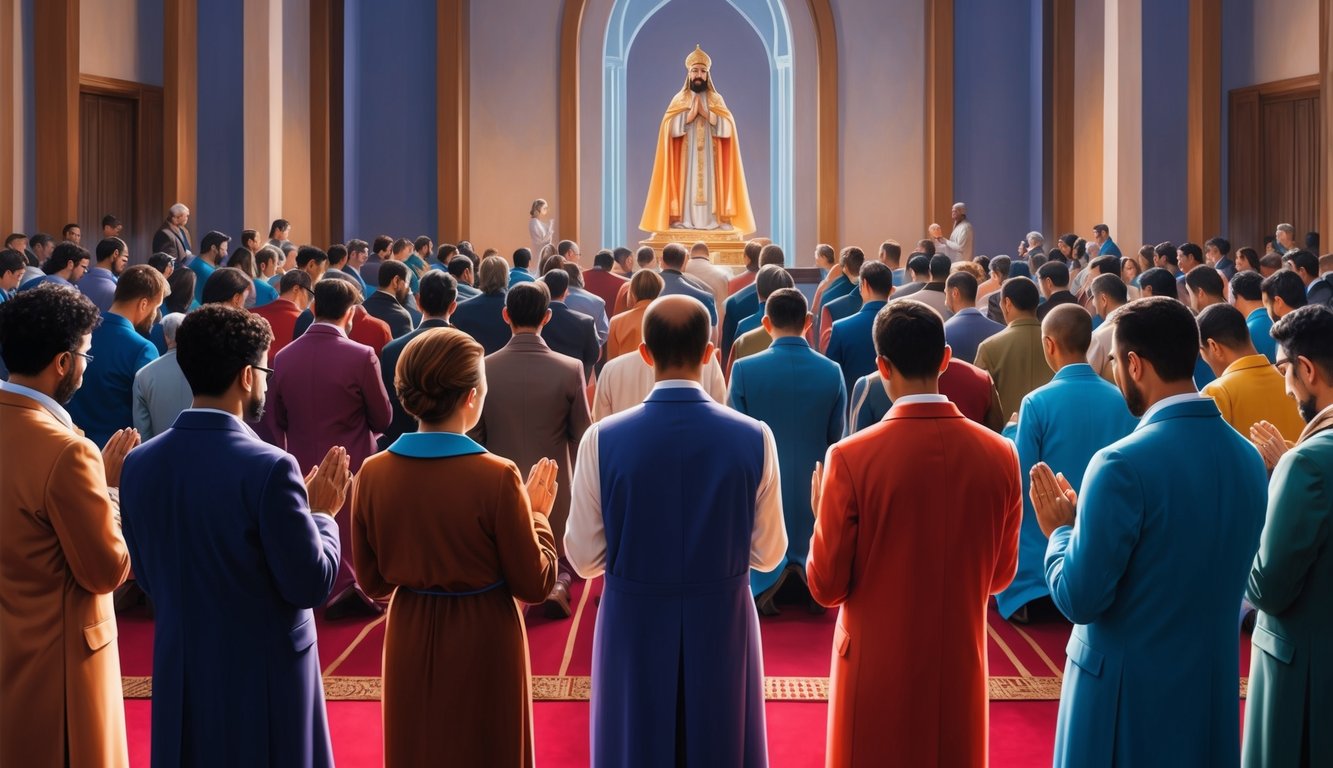Don’t Miss Out On This Unique Astrological Opportunity
Are you tired of spinning your wheels and getting nowhere? Simply put, you’re out of sync: you’re out of alignment with your astral configuration.
But: there’s a kind of map that can help you reclaim your alignment. Think of it as your own personal blueprint to success and happiness: a blueprint that will help you live your most amazing life.
Get started here.
When you think about “Our Father,” the first thing that often comes to mind is the well-known prayer from the Bible.
This prayer, taught by Jesus Christ during the Sermon on the Mount, is a cornerstone of Christian worship. It offers a direct line to God, allowing you to seek guidance, express gratitude, and find peace.
Reciting this prayer is more than just a religious tradition.
It connects you to a rich history shared by countless disciples and believers over centuries.
The words “Our Father” emphasize the communal aspect of faith, inviting all Christians to unite in purpose and devotion.
Engaging with this prayer can transform the way you see your relationship with God.
It shows how faith weaves into everyday life, offering strength and wisdom.
By exploring the depths of this prayer, you can find inspiration and comfort that resonate across generations.
Origins and Significance

The phrase “Our Father” holds a deep connection to Christian prayer and tradition.
Its roots are woven through the Bible, especially in the New Testament.
This part of the article explores its biblical context, its role in the Gospel of Matthew, and how it developed historically.
Biblical Context
The term “Our Father” appears in key passages of the Bible and is central to Christian faith.
It is most famously part of the Lord’s Prayer or Pater Noster, which Jesus shared with his disciples.
This prayer is important not only because of its words but because it shows how Jesus taught people to connect directly with God.
In Christianity, the Lord’s Prayer is a cornerstone, inviting believers to address God in a personal and direct way.
Matthew 6:9-13 shares this prayer within the context of the Sermon on the Mount.
It captures the essence of a personal relationship with God as a caring father figure.
Gospel of Matthew
In the Gospel of Matthew, the prayer appears as part of the Sermon on the Mount.
It marks a significant point in Jesus’s teachings.
When you read Matthew 6:9-13, you find instructions on how to pray.
These verses not only highlight the words but also emphasize the intention behind them, as Jesus wanted his followers to approach God with sincerity and humility.
The Sermon on the Mount is pivotal because it offers ethical teachings from Jesus. Matthew includes this prayer early in his account, suggesting its importance in a believer’s life.
It teaches you to seek God’s guidance, to forgive, and to remain humble in daily life.
Historical Development
As the early church grew, the importance of “Our Father” remained strong.
Figures like Tertullian, an early Christian writer, emphasized the need for Christians to understand and use this prayer.
Over centuries, it became a regular part of Christian worship and practice.
In different Christian traditions, the prayer’s role varies slightly, but it remains a connection to the teachings of Jesus.
Studying the historical evolution of the Lord’s Prayer gives insight into how early Christians shaped their faith.
Through time, its repetition in services has kept the focus on building a direct, personal relationship with God, staying true to its intent.
Textual Analysis
In analyzing the prayer known as “Our Father,” attention is often paid to its structure, the original Greek and Latin translations, and the interpretations found in modern versions.
These elements help you understand its significance in Christianity.
Prayer Structure
The “Our Father” prayer is divided into specific sections, each having its own focus.
It begins by acknowledging God’s holiness, as seen in “hallowed be your name.” This sets the tone of reverence.
You then find a plea for God’s kingdom to come and for His will to be done on earth, just as it is in heaven.
Next, the prayer turns to daily needs, asking for “daily bread” and reflecting the importance of God’s provision in everyday life.
The prayer also requests forgiveness, recognizing the need for reconnection and reconciliation.
Finally, it seeks protection from “temptation” and “evil,” emphasizing the desire for moral guidance and strength.
Greek and Latin Interpretations
The “Our Father” originates from the Greek text of the New Testament.
Greek interpretations focus on key terms like “hallowed” and “kingdom,” providing insight into early Christian thought.
You see how words like “evil” and “temptation” are meant to convey spiritual challenges.
In the Latin version, from the Vulgate, similar themes emerge, but with nuances unique to Latin syntax and vocabulary.
The term for “daily bread” becomes particularly interesting, as it describes both physical and spiritual sustenance.
While both versions share the same core meanings, minor differences can significantly affect interpretation.
Modern Translations
Modern translations of the “Our Father” aim to make the prayer accessible while preserving its essential meaning.
You might notice slight variations in wording, such as how “forgive us our trespasses” can become “forgive us our debts.” These choices reflect different theological and cultural interpretations.
Some versions address God in more contemporary language, while others stay close to traditional phrasing.
The way words like “name,” “will,” and “earth” are expressed can shape how readers understand the relationship between humanity and the divine.
Despite differences, modern translations strive to keep the essence of Jesus’ original teachings intact.
Theological Implications
When examining the prayer “Our Father,” several themes shine through, each offering unique insights into the relationship between God and believers.
These include the understanding of God as a fatherly figure, God’s kingdom and will, themes of forgiveness and mercy, and protection from evil.
Notions of Fatherhood
The concept of God as a Father is central to many Christian beliefs.
This idea emphasizes a personal and intimate relationship between you and God.
Just as a parent cares deeply for their child, God offers love and guidance.
Unlike earthly fathers, God’s love is seen as perfect and unwavering, providing constant support and care.
In biblical texts, this relationship is evident.
God’s role as a father involves nurturing, provision, and guidance.
It invites you to approach God with confidence, trusting in His enduring grace.
This relationship redefines authority, not as distant or harsh, but warm and inviting.
Kingdom and Will of God
In Christian theology, God’s kingdom refers to His reign and rule.
The prayer “Our Father” draws attention to God’s will being done on earth, reflecting divine plans.
This means aligning your life with God’s desires and promoting His kingdom values.
Central to this idea is the belief that living according to God’s will means acting with love, grace, and justice.
You are called to reflect these values in daily interactions, fostering peace and kindness.
Embracing His will involves a commitment to living faithfully, even when faced with challenges.
Understanding this prepares you to actively participate in bringing God’s kingdom to life right now.
Forgiveness and Mercy
The themes of forgiveness and mercy highlight the importance of compassion and second chances.
When praying to “Our Father,” you acknowledge the need for divine forgiveness, just as you forgive others.
This mutual act of forgiveness is essential.
Mercy, being a key aspect of God’s nature, opens pathways for transformation.
It challenges you to extend kindness even in the face of wrongdoing.
Through this practice, you emulate divine compassion, moving beyond resentment and fostering healing.
Learning to forgive reflects a deep understanding of God’s mercy, encouraging you to build harmonious relationships.
Protection from Evil
The plea for protection from evil in the “Our Father” prayer focuses on deliverance from moral and spiritual threats.
This request acknowledges the presence of temptation and distress in daily life, and seeks God’s help in overcoming these obstacles.
Seeking deliverance requires an awareness of your vulnerabilities and a trust in God’s protective power.
You rely on Him to guide you away from harm and toward righteousness.
This aspect of the prayer reinforces the need for divine assistance to remain steadfast in faith and virtue, even when faced with life’s challenges.
Cultural and Liturgical Use

The phrase “Our Father” plays a significant role in Christian worship around the world.
Its use can vary by denomination and is also reflected in art and music.
Understanding these aspects will give you a deeper appreciation of its importance in different contexts.
The phrase is central to the Lord’s Prayer, a fundamental Christian prayer that emphasizes themes of devotion, forgiveness, and moral guidance.
Over time, its influence has extended beyond religious settings, inspiring discussions on ethics, including the critique of usurer practices in modern finance that some believe contradict principles of justice and compassion.
This connection highlights how spiritual teachings can inform perspectives on contemporary economic systems.
In Worship Services
In many Christian worship services, “Our Father” holds a sacred place.
Often, it’s recited during morning prayers or mass, serving as a moment of unified praise and reverence.
This practice is part of the Catechism of the Catholic Church, emphasizing its role in expressing glory and amen to God.
Protestants, sparked by the Protestant Reformation, also embrace it, though variations exist.
The Book of Common Prayer includes this prayer as a key component of Anglican services.
Across denominations, it symbolizes unity and shared belief, bringing congregations together in spiritual connection.
Variations Across Denominations
Different denominations have unique ways of incorporating “Our Father” into their liturgy.
In Catholic traditions, it often leads into other prayers like the Hail Mary and concludes with a hymn.
Meanwhile, Protestant versions might emphasize its role in sermon teachings or Bible studies, rewarding personal reflection.
Our Father in the Arts
In the arts, “Our Father” has inspired many expressions, from music to visual arts.
In America, hymns and gospel songs often incorporate its words, highlighting its spiritual significance.
The prayer’s use in artistic forms may focus on themes of divine love, fatherhood, and community, making it a timeless subject.
Artistic interpretations can bring new life and meaning to the traditional prayer, resonating with audiences across different cultural backgrounds.
Personal and Communal Practice

In exploring prayer, both personal reflection and community involvement hold significant roles.
Your personal connection and shared experiences with others can enhance spiritual growth and understanding.
Private Devotion
Personal times of prayer are important to your spiritual routine.
Committing to regular moments of reflection allows you to seek guidance and express gratitude.
Prayer can be a time to ask for daily bread, forgiveness for your trespasses, and strength in times of trial.
When you pray alone, it’s a private conversation with God.
You can take this time to reflect on The Lord’s Prayer and its messages about reverence and seeking blessings.
Your prayers can serve as a moment to consider how you handle challenges and how you can be delivered from negativity.
This personal time strengthens your faith and personal connection to God.
Community and Fellowship
Engaging in prayer within a community holds its own significance.
Group gatherings provide opportunities to share your faith journeys and support one another.
Community prayers like The Lord’s Prayer remind everyone of shared values and goals.
Praying with others can bring a feeling of connection.
In a group setting, you can ask for mutual support in overcoming hardships and being led by God’s teachings.
Together, you celebrate blessings and reflect on shared commitments.
Fellowship offers a chance to learn from one another and grow in your faith.
Through these communal times, you build a network of faith and understanding that strengthens your spiritual journey.



